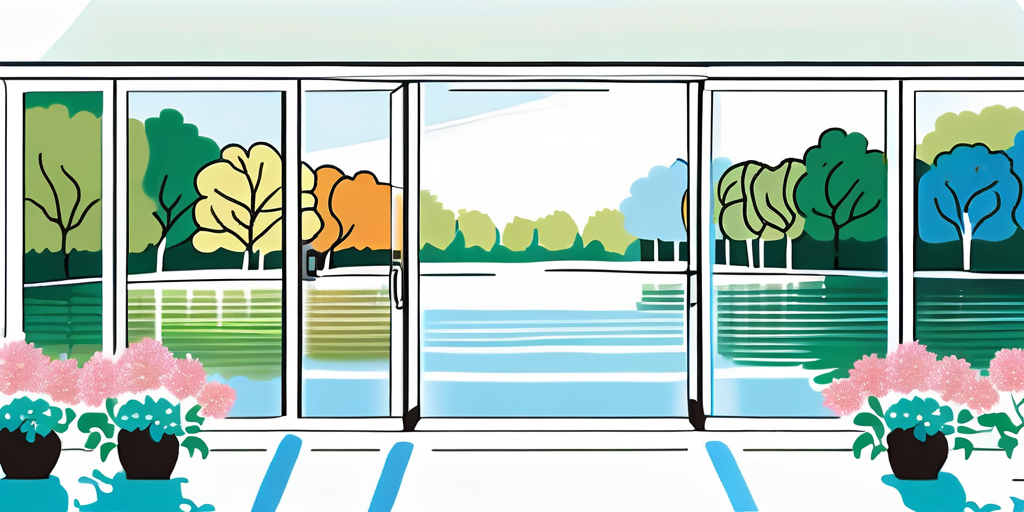
Are you dreaming of a serene lifestyle, where you can wake up to the gentle lapping of waves and panoramic views of sparkling waters? Lakefront homes have a unique charm that draws many to consider them as their next residence. This guide will delve into what makes these properties so appealing, the considerations for potential buyers, and vital legal aspects to keep in mind.
Living on the lake offers more than just a beautiful view; it’s a lifestyle infused with tranquility and adventure. For many, the allure of waking up to the sight of a glistening lake on a sunny morning makes it a dream worth chasing.

One of the most significant benefits of lakefront living is the peace that comes with it. The serene atmosphere created by the calming sounds of nature can significantly reduce stress levels, making any home feel like a personal retreat.
Whether it’s enjoying a quiet moment with a cup of coffee on your deck or watching sunset reflections on the water, these views are more than just picturesque—they offer a daily reminder to slow down and appreciate life's simpler pleasures. The gentle lapping of waves against the shore, the rustle of leaves in the breeze, and the occasional call of a distant loon create a soundtrack that soothes the soul. This connection to nature can inspire mindfulness and a deeper appreciation for the environment, encouraging residents to engage in sustainable practices that protect their cherished surroundings.
Heading to the lake brings a plethora of recreational activities, ensuring fun and adventure all year round. From swimming, fishing, and boating in the warmer months to ice skating, snowshoeing, and cozying up by the fire in the colder months, there is always something to do.
Imagine hosting summer barbecues with friends, where water sports and sun-soaked afternoons become the norm. Or perhaps, a peaceful evening paddle during the golden hour is more your style. The options are endless and create memorable experiences for families and friends alike. Additionally, many lakefront communities offer organized activities such as sailing lessons, fishing tournaments, and guided nature walks, providing opportunities for residents to learn new skills and bond over shared interests. The vibrant social scene around these activities fosters a sense of camaraderie, making every season feel like a celebration of life by the water.
Life near the lake often fosters a sense of community and belonging. Neighbors tend to be friendlier as they share a common appreciation for the natural surroundings and lifestyle that lakefront living provides. Community events, whether it be lake clean-ups or summer festivals, help to strengthen these ties.
Plus, living near water often attracts like-minded individuals who enjoy outdoor activities, creating a perfect social atmosphere for shared experiences and lasting friendships. Many lakefront residents find themselves participating in book clubs, gardening groups, or even local art classes, all of which are enriched by the stunning backdrop of the lake. This vibrant community spirit not only enhances personal connections but also promotes a collective responsibility towards preserving the beauty and health of the lake, ensuring that future generations can enjoy the same idyllic lifestyle.
While the allure of lakefront living is evident, it’s essential to weigh critical factors before diving in. Purchasing a home by the water involves unique considerations that can impact your enjoyment of the property and long-term investment.
Access to the water can vary significantly from one property to another. Some homes come with direct access to the lake, while others might require a bit of a trek. It’s crucial to assess the quality of water access and its implications for leisure activities.
Consider questions like: Is the water shallow or deep? Are there any beaches or docks nearby? Keep in mind that poor accessibility can detract from the overall enjoyment of your lakefront property. Additionally, think about the types of activities you envision enjoying on the water. If you plan to kayak, swim, or fish, having easy access is paramount. Investigating local regulations regarding watercraft and swimming zones can also provide clarity on what you can and cannot do on your new property.
Homes by the lake can face particular weather challenges. It’s important to evaluate how the house withstands local climate effects, such as flooding or heavy storms. Homes designed with weather-resistant materials are essential to ensure long-term durability, while proper landscaping can help mitigate potential water damage.
Talking to neighbors about their experiences can also provide helpful insights into weather patterns and how they affect properties in the area. Furthermore, consider the elevation of the property in relation to the water level. Properties that are situated too close to the lake may be at risk during heavy rains or snowmelt, which can lead to flooding. Investigating the history of the area’s weather events can give you a clearer picture of what to expect and how to prepare your home.
Maintenance on a lakefront home can be different from traditional homes. The presence of water can accelerate wear and tear due to humidity, algae, and other environmental factors. Regular cleaning and upkeep of your property, dock, and boats are vital to maintain their integrity.
Think about the routines required to keep your home in prime condition—are you prepared for maintenance tasks like maintaining the shoreline or managing landscaping? Understanding these aspects early on can save you headaches down the line. Additionally, consider the costs associated with maintenance. Regular inspections of your dock and any outdoor structures can prevent costly repairs later. You might also want to explore local services that specialize in lakefront property upkeep, as they can offer tailored solutions to the unique challenges posed by living near water.
Before committing to a lakefront home, it's essential to understand the financial landscape. Buying property by the water can often involve substantial investments, and being informed is crucial for a sound decision.

Lakefront properties can carry a premium price tag, reflecting their desirable location and the recreational opportunities they present. Beyond the purchase price, it’s vital to account for closing costs, which can add up significantly.
Consulting with real estate experts who understand the local market can provide insights on how to find the best value for your investment and identify properties that meet your budget and lifestyle needs. Additionally, it’s important to consider the potential for future renovations or upgrades, which can enhance both your enjoyment of the property and its market value. A thorough inspection of the property can reveal any hidden issues that might require immediate attention, helping you avoid unexpected costs down the line.
The beauty of lakefront living often comes with ongoing costs, such as property taxes, homeowner's insurance, and potentially homeowners association (HOA) fees. These can vary based on location and community features.
It’s wise to budget for these costs in your homeownership plan, as they can significantly impact monthly expenses. Being educated on the details of ongoing financial obligations will facilitate smoother sailing in your lakefront adventure. Furthermore, consider the unique insurance needs that come with a lakefront property, such as flood insurance or additional liability coverage, which may be necessary depending on the proximity to the water. Understanding these nuances can help you avoid surprises and ensure that your investment remains protected.
Off-season, your lakefront home could serve as a lucrative rental property, providing passive income that can offset ownership costs. Many buyers explore options like short-term vacation rentals, which can be appealing in popular lake destinations.
Moreover, as more people seek lakefront living, property values may appreciate over time, contributing to your wealth and equity. Make sure to investigate rental regulations in your desired area to maximize this opportunity. Additionally, engaging with local property management services can ease the burden of managing rentals, allowing you to enjoy your property while still reaping the financial benefits. It’s also beneficial to keep an eye on market trends and community developments that could further enhance property values, ensuring that your investment continues to grow in the long run.
Owning a lakefront property also means being mindful of various legal and environmental factors. Understanding these can protect your investment and ensure you enjoy all the benefits of living by the water.

Water rights vary significantly based on location, often influenced by state laws and regulations. It's critical to understand your rights regarding water usage, particularly if you're considering dock installation, boating, or other water activities.
Consulting with a local real estate lawyer specializing in waterfront properties can help clarify any restrictions and ensure you are compliant with local regulations. Additionally, it’s wise to investigate any historical water rights disputes in the area, as these can impact your property ownership and usage rights. Understanding the nuances of riparian rights—those associated with landowners whose property borders a waterway—can also provide insight into how you can utilize the lake while respecting the rights of your neighbors.
Many regions have environmental regulations that protect water quality and wildlife habitats. Familiarizing yourself with these regulations is important to avoid fines and maintain a healthy ecosystem around your property.
Participating in local conservation efforts can not only contribute to the environment but also foster community ties and showcase your commitment as a responsible lakefront homeowner. Engaging with local environmental groups can provide resources and support for initiatives such as shoreline restoration, invasive species management, and water quality monitoring, which are vital for preserving the natural beauty of the lake and its surroundings. Furthermore, being proactive about maintaining your property’s landscaping can help prevent runoff that might harm the lake’s ecosystem, ensuring that future generations can enjoy the same pristine environment.
Before making a purchase, check on local zoning laws and potential future developments in the area. Understanding these factors can help you assess whether the neighborhood aligns with your lifestyle and values.
Future developments may affect property value and your enjoyment of the area, so it's worth conducting thorough research and possibly engaging local authorities for updated information. Additionally, attending town hall meetings can provide insights into upcoming projects and community plans, allowing you to voice your opinions and concerns. This involvement not only keeps you informed but also helps you build relationships with your neighbors and local officials, creating a sense of community that is invaluable for lakefront living.
In conclusion, lakefront living is an enticing venture filled with adventure, community, and natural beauty. By carefully considering the appeal, critical aspects of purchase, financial implications, and legal factors, you are well on your way to finding the ideal home on the water. Enjoy the journey of discovering your slice of paradise!